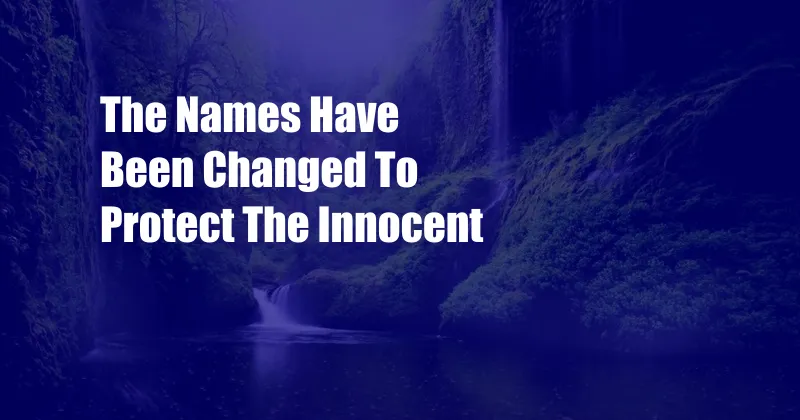
**The Names Have Been Changed to Protect the Innocent**
In the annals of writing and publishing, there is a time-honored tradition of using pseudonyms to safeguard the privacy of individuals involved in sensitive or controversial stories. While this practice may seem like a relic of a bygone era, it remains an essential tool for protecting sources and shielding subjects from potential harm.
This practice is particularly relevant in cases where individuals fear retribution or backlash for speaking out. By using pseudonyms, authors can provide a safe space for their subjects to share their experiences and perspectives without compromising their safety or anonymity.
**Anonymity in Journalism**
The use of pseudonyms in journalism has been a cornerstone of investigative reporting for decades. In cases where sources fear for their safety or the safety of their loved ones, anonymity can provide a crucial layer of protection.
For example, in the wake of the Watergate scandal, the anonymous source known as “Deep Throat” played a pivotal role in exposing the corruption and cover-up within the Nixon administration. The use of a pseudonym allowed Deep Throat to provide information to the press without jeopardizing his own identity or career.
**Protecting Victims and Witnesses**
Beyond investigative journalism, pseudonyms are frequently used to protect the identities of victims and witnesses in sensitive cases. In cases involving sexual assault, domestic violence, or other traumatic experiences, anonymity can provide a safe space for individuals to share their stories without fear of retaliation or further victimization.
For instance, in the #MeToo movement, many victims chose to use pseudonyms or remain anonymous to protect their privacy and avoid potential backlash from perpetrators or their supporters.
**Balancing Anonymity with Accountability**
While anonymity can be a powerful tool for protecting sources and subjects, it also raises important questions about accountability. Critics argue that anonymity can shield individuals from responsibility for false or defamatory statements.
To address these concerns, journalists and publishers have developed ethical guidelines for using pseudonyms. These guidelines typically require that authors verify the identities of anonymous sources and have a reasonable basis for believing that their information is credible.
**The Psychology of Pseudonyms**
The use of pseudonyms has a profound psychological impact on both the author and the subject. For authors, using a pseudonym can provide a sense of freedom and liberation, allowing them to explore sensitive topics without fear of judgment or reprisals.
For subjects, anonymity can empower them to speak out about their experiences and perspectives without the burden of public scrutiny or fear of retribution. By providing a safe space for individuals to share their stories, pseudonyms can foster a culture of open dialogue and accountability.
**Ethical Considerations**
Using pseudonyms is not without its ethical implications. Authors and publishers have a responsibility to use pseudonyms judiciously and to ensure that they are not being used to deceive or manipulate readers.
It is also important to consider the potential impact of pseudonyms on the public’s trust in journalism. When readers are aware that individuals are using pseudonyms, they may question the credibility and reliability of the information being presented.
**Tips for Using Pseudonyms**
If you are considering using pseudonyms in your writing, it is important to follow these tips to ensure ethical and responsible use:
1. Verify Source Credibility: Ensure that your anonymous sources are credible and have firsthand knowledge of the events they are describing.
2. Use Clear and Concise Pseudonyms: Choose pseudonyms that are easy to remember and are not likely to be associated with real individuals.
3. Protect Subject Privacy: Take all necessary steps to protect the identities of your subjects, including using secure communication channels and encryption.
**Expert Advice**
In addition to the tips above, consult with experts in journalism, law, and ethics to ensure that you are using pseudonyms in a responsible and ethical manner.
By following these guidelines, you can harness the power of pseudonyms to protect sources, shield subjects from harm, and foster a culture of open dialogue and accountability in your writing.
**FAQ**
Q: Why is it important to use pseudonyms?
A: Pseudonyms protect the privacy of individuals involved in sensitive or controversial stories, providing a safe space for them to share their experiences and perspectives without fear of retribution or backlash.
Q: Is it ethical to use pseudonyms?
A: Yes, it is ethical to use pseudonyms as long as they are used judiciously and in accordance with ethical guidelines. Authors and publishers have a responsibility to verify the credibility of anonymous sources and to use pseudonyms in a way that does not deceive or manipulate readers.
Q: How do I choose a pseudonym?
A: Choose a pseudonym that is easy to remember and is not likely to be associated with a real individual.
**Conclusion**
Using pseudonyms is a valuable tool for protecting the privacy of individuals involved in sensitive or controversial stories. By following ethical guidelines and using pseudonyms judiciously, authors and publishers can foster a culture of open dialogue and accountability while safeguarding the safety and well-being of their sources and subjects.
Are you interested in the topic of using pseudonyms in journalism?